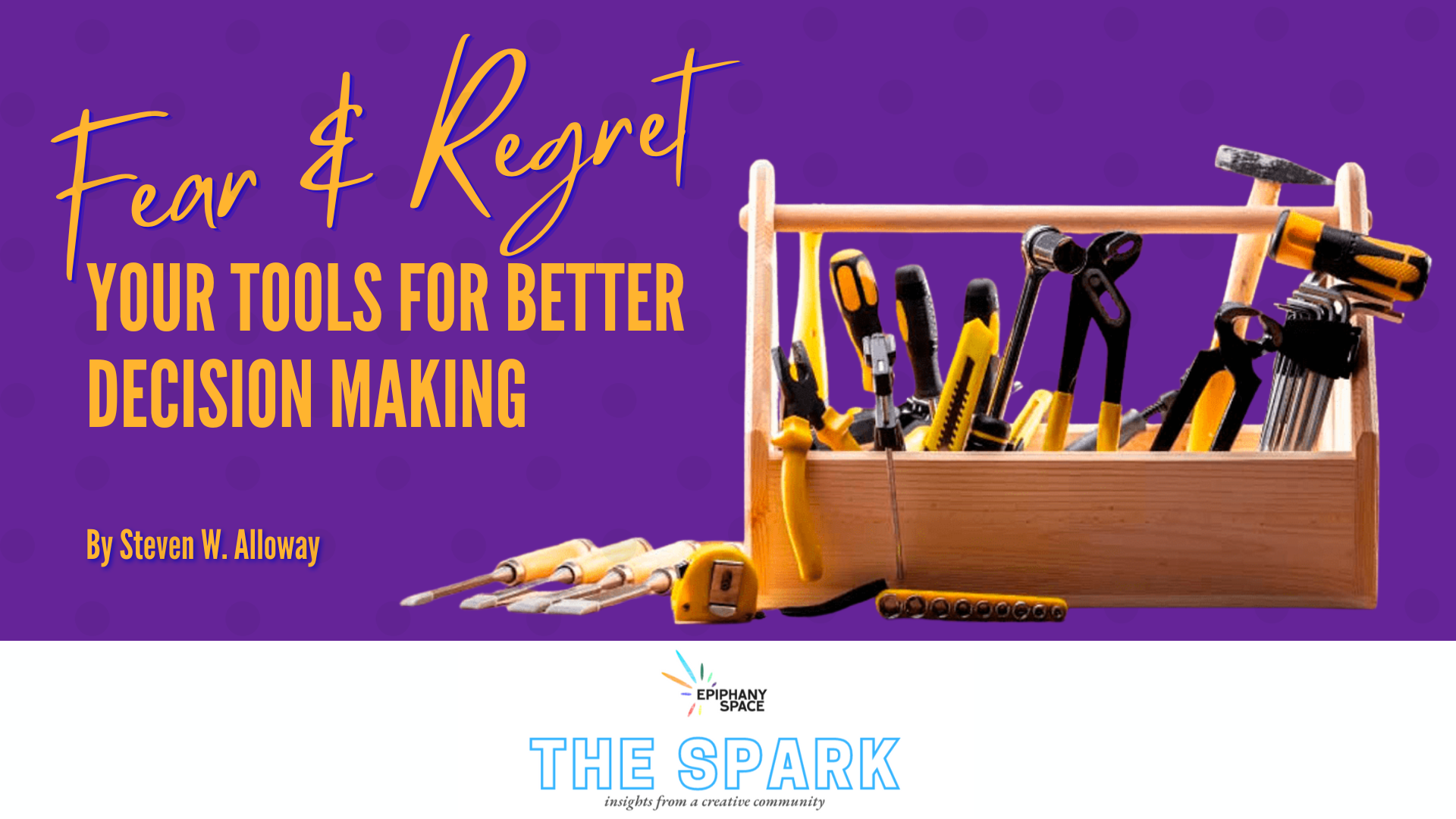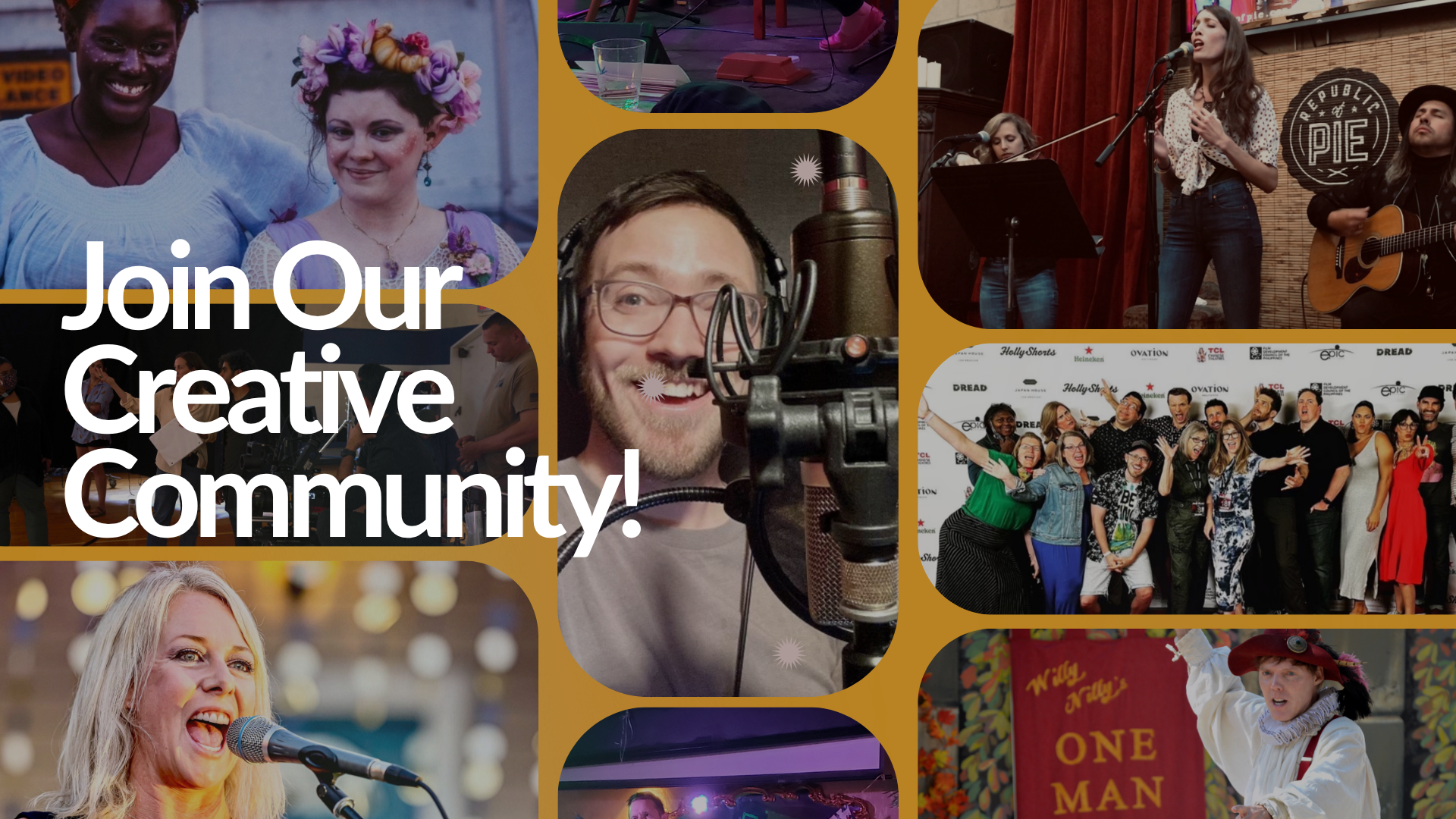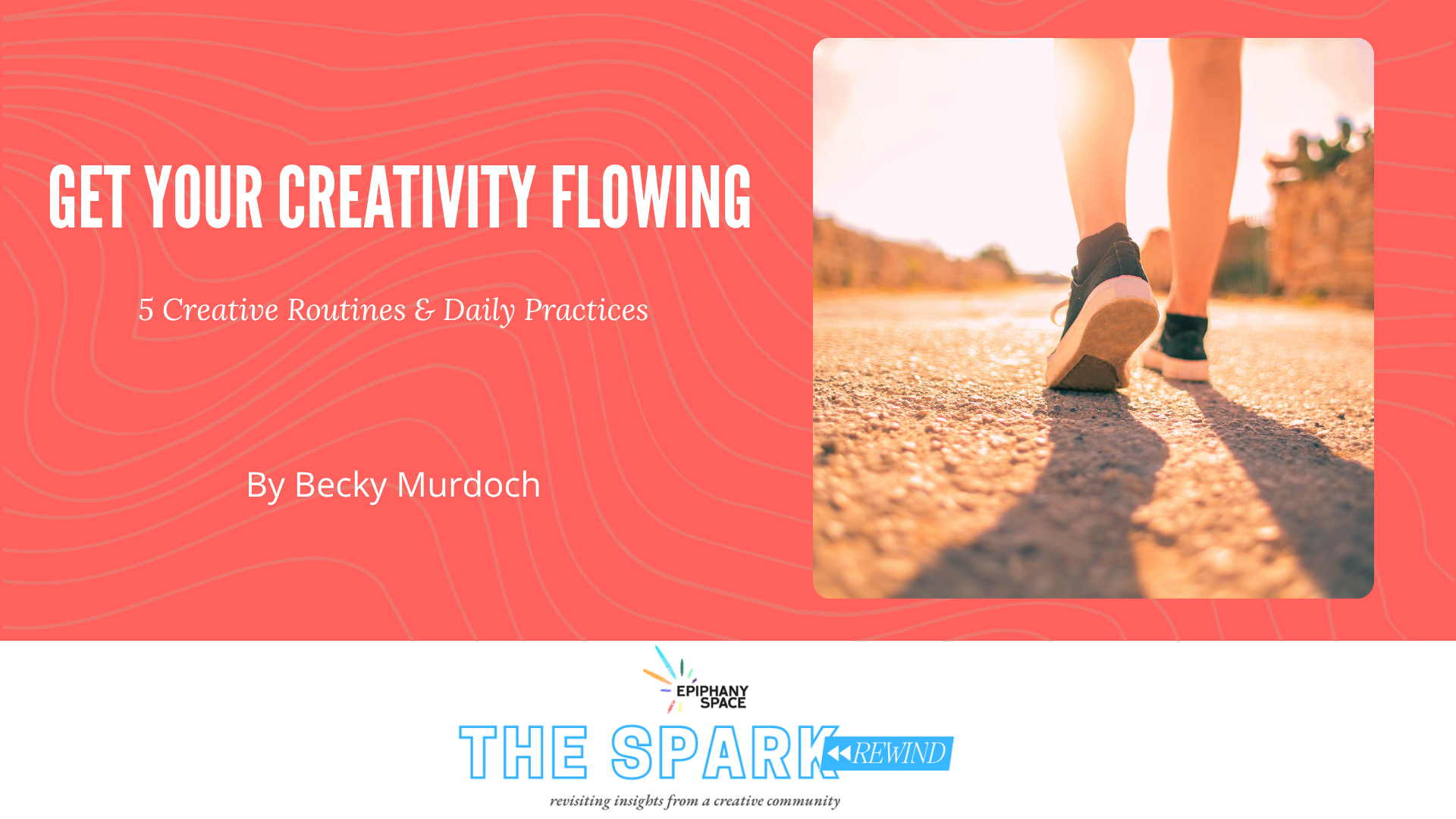Article
Fear and Regret: Your Tools for Better Decision Making | By Steven W. Alloway
Fear & Regret: Your Tools for Better Decision Making
By Steven W. Alloway

A couple of years ago, I accepted an offer to be in a play, purely out of spite. Not out of spite for the director, the other actors, or anyone else involved in the show. Nor out of spite for the theater company or anyone who might be in the audience. No, it was out of spite for an article I read.
I don’t remember much about it, but it was something about metrics to help you make decisions, particularly with regards to evaluating opportunities and taking on new projects. If you’re faced with the possibility of, for instance, quitting your job, going on a trip somewhere, or taking on some new responsibility, and you’re unsure of whether or not you should do it, the article listed a number of guidelines that could help you decide.
At the time, I was, in fact, faced with just such a decision. I’d been offered a part in a show. I didn’t know if I wanted to take the part or not. On the one hand, it could be fun. It was with a theater company that I generally enjoy working with. On the other hand, it would be a lot of time, a lot of work, and a lot of gas going back and forth to rehearsals—not to mention, most of the cast was people I didn’t know. Did I really want to commit to doing a show right then, when I knew all of that was in store?
My pending decision wasn’t the reason why I was reading the article. It was just something I happened across and thought it looked interesting. And particularly since many of the points it made were about business decisions, rather than artistic ones, I didn’t even think about the play until I was about halfway through. And then I saw it:
“If your answer isn’t an enthusiastic yes, then it’s a no. If you’re having doubts or reservations, or you’re not super excited to take on the project, then don’t do it.”
“Well, that’s just stupid,” I thought. “If I waited until I had no doubts or reservations, until I was overwhelmingly enthused, to say yes to a project, then I’d literally never do anything.”
There have been plenty of times in my life where I wasn’t sure about a project, or was just kind of lukewarm about it, but I did it anyway. And it turned out to be an incredible experience. An experience I’d have missed out on if I had decided I wasn’t enthusiastic enough and turned it down.
So with that in mind, I stopped reading and immediately emailed the director, “I’m in,” on this show I was apprehensive about, purely to spite the terrible, stupid advice in that article. And sure enough, the show ended up being a great experience, and something I’m glad I didn’t miss.
“Only do it if you’re enthusiastic about it” may sound like good advice on the surface, but it fails to take into consideration two of the most important factors when it comes to making decisions: Fear and Regret. Without them, you have no hope of growing as an artist or as a person. Not only that, but your life will be incredibly boring.
Embracing Fear
I think I’ve talked before about some much better advice I’ve gotten with regards to taking on projects and making decisions: If you’re scared to do something, it’s a sign you should probably do it. I’ve even heard it said that, at any given time, you should always have at least one thing on your plate that terrifies you to your core.
The only way to grow, to evolve, to expand your horizons, is to do things that are out of your comfort zone. Which means agreeing to do things even though they scare you. Which means agreeing to do things BECAUSE they scare you.
Maybe it scares you because you think you’re not ready. Maybe it scares you because you think you’re not good enough. Maybe you’re afraid you’ll screw it up. Maybe you’re afraid of embarrassing yourself, doing something you’ve never done before. Well, let me address those fears one by one.
1. You will never be ready. Or at least, you will never FEEL ready. Not really, not fully. Do it anyway.
2. “Good enough” is relative. You are absolutely good enough to put yourself out there and try. But as far as being actually good at something goes, you never will be unless you start doing it, and keep doing it. So do it.
3. You absolutely will screw it up. Often. Sometimes royally. Go for it anyway. Screwing up is part of the process. If you’re not screwing up, you’re not learning.
4. You will definitely embarrass yourself, too. But not nearly as badly as you think you’re going to. Most of the time, people won’t notice. And if they do, they’ll typically forgive you. Why? Because if they know enough about what you’re doing to see that you’ve embarrassed yourself, it most likely means they’ve also embarrassed themselves in a similar way, probably many times.
Flub your line in a play? Generally, even if you pause and stumble over your words a little, most of the audience will have no idea. The only people who will know you got the line wrong are the people who know the play you’re doing—and they also know how hard the play is to learn, because they’ve done it.
Play a wrong note in a musical performance? Same deal. The people who can tell the note is wrong can also see how hard you’ve had to work to get to the point where you are now. And they’ll respect you for that.
Like making mistakes, embarrassment is also part of the process. You screw up, you get embarrassed, you learn from it, you get better. You’ll never actually reach a point where you stop screwing up, or getting embarrassed. But if you stick with it long enough, you can reach a point where fewer and fewer people actually understand the nuances of what you’re doing well enough to notice the mistakes you make.
The bottom line is this: If you only do the things you’re enthusiastic about, that leaves no room for apprehension, for anxiety, for pure, abject terror. It leaves no room for taking risks. And if you’re not taking risks in your creative journey, then it’s not really a journey at all. Just a casual stroll around the same general area, again and again.
But if you push through the apprehension and take on projects that scare you, it can help you conquer those fears. Once you come out on the other side, you’ll look at what you were so afraid of and be able to say, “I did it!” And then hopefully, the next time it won’t be so scary. Instead, it will be a part of who you are and what you can do—part of a real creative journey, to destinations you’ve never imagined.
Of course, once you conquer your fear, then you’ll have to find something else to do that scares you. And don’t worry, you will. As you get better, go further, climb higher, you’ll find things to scare you that right now you’ve never even considered. It’s a world of terrors out there. But it’s also a world of opportunities. And the only way to the latter is through the former.
Pushing Past Regret
“Screwing up is one thing,” I hear you say. “But what if I take on this project, and it’s a total disaster? What if it’s a terrible experience, and I end up hating and regretting it?” Let me tell you something about regret. I’ve made many, many mistakes in my life. I’ve screwed up plenty of times and in plenty of ways. But there are very few things that I regret doing. When I think back on my regrets, most of them are things I
didn’t do.
Sometimes you may have bad experiences. Sometimes you may even wish you hadn’t agreed to do the project at all. But typically, those regrets last only about as long as the experience does. Once it’s over, you’ll move on to the next project, and the terrible time you had will be quickly forgotten. You might think back, a few years from now, “Oh, what a lousy experience that was,” but you won’t be thinking, “I wish I hadn’t done it.” You might even be thinking, “Wow, what a story that was.”
On the other hand, if you don’t do it, that’s when, years from now, you’ll look back and say, “I wish I had.” Whatever excuse you have for not doing it will seem petty and trivial. I can’t count the number of times I’ve had the opportunity to go places and do things that seemed awesome, but ended up turning them down, because I just didn’t feel like going.
Then, a week, a month, a year later, I’ll find myself thinking, “Wait… That actor from that TV series I really like was doing a show within a half-hour drive of me… And I didn’t go because I didn’t feel like looking for parking?” In the moment, it seemed like a valid reason, but in hindsight, it feels ridiculous, and all I see is the opportunity I missed.
A Regrettable Experience
A few months after I did the show I talked about earlier, a good friend from that same theater group invited me to do another show that he was producing/acting in, and another friend of ours was directing. It sounded like it could be fun, and I had nothing else going on at the time, so I agreed to join the cast.
Then at the first rehearsal, it turned out there had been some miscommunication. Both the play and the part I’d been cast in were very different from what I thought they’d be. When the director explained her vision for the show, I was very uncomfortable with the whole thing. If I’d known from the beginning what I was getting myself into, I would have turned it down. But I’d already agreed, already come to rehearsal, and it’s my policy never to drop out of a show once I’m on board. So I soldiered on.
“And it ended up being a much better experience than you thought it would be, and you had a lot of fun and grew as an actor and as an artist, right?” No. The show was an unmitigated disaster from beginning to end. My policy of never dropping out of a show was tested repeatedly, but it remained firm—which put me one up on the director, who walked out the night before dress rehearsal and never came back. It was not a good experience, and I spent most of my time looking forward to when the run would be over and I could put the whole thing behind me.
Then, a couple of months later, my friend, who had produced the show and recruited me for the cast, died, very suddenly and completely unexpectedly. That terrible, stupid show was the last time I ever worked with him. It may have been a miserable experience at the time, but I don’t regret it for a minute. And when I think about that show now, I don’t think about the discomfort, the chaos, the total upheaval. I think about the time spent sharing the stage with my friend.
I spent a few weeks regretting that show. But if I hadn’t done it, I know that I would regret it to this day. And what’s more, even before my friend died, the regrets of that show had mostly faded. It was a bad experience, sure. But once it was over, you know what it became? A heck of a story. I’ve found that’s true with most regrettable experiences. The awkward or unpleasant part ends quickly. But the stories last forever.
Balancing Boundaries
When it comes to making decisions, fear and regret shouldn’t mean an automatic no. But obviously, they shouldn’t mean an automatic yes, either. They’re both factors in your decision, and they can be positive factors. But they’re not the only factors. In other words, it’s still important to have boundaries.
In fact, not being comfortable with something often IS a good reason not to do it. There could be health and safety issues—both physical and emotional. There could be red flags that make you reevaluate the situation. Or you could just legitimately not have the time or the energy, or prefer to take a break rather than diving into something new. All of that is valid.
But when making these decisions and setting your boundaries, the most important thing is to be in touch with why. If the reason is that you’re scared or uncomfortable, follow that thread further. Why does this scare you? What would or could happen if you do this thing? What would or could happen if you don’t? What benefits could there be in saying yes? What regrets could there be? Will you still be thinking about those regrets six months after the project is over? And how much and how long will you regret it if you say no?
If, after considering all of this, you still want to say no, then by all means, go ahead and say no. But go in with your eyes open. Understand why you’re saying no, and make sure you’re doing it for the right reasons. Because if the only thing holding you back is a vague, “I’m scared, and I might regret it,” then you’re missing out on so many incredible things.





